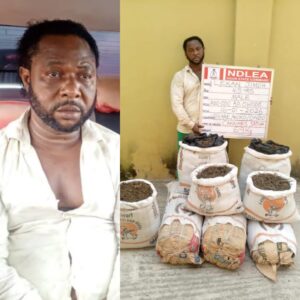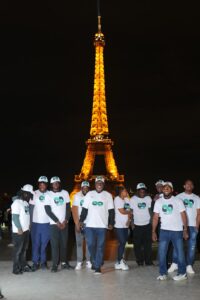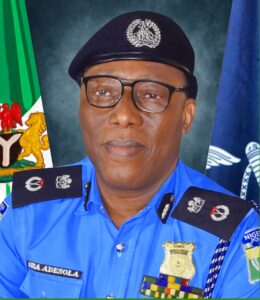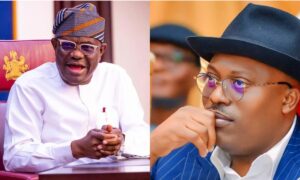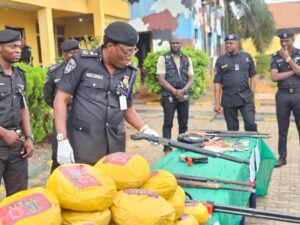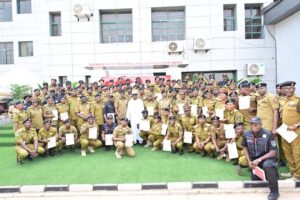AND THE BATON CHANGES: ‘A Nation in Search of a Fulfilled Future Goes to the Polls’ – Emiko Aruofor.
5 min read
Emiko Aruofor
AND THE BATON CHANGES: ‘A Nation in Search of a Fulfilled Future Goes to the Polls’ – Emiko Aruofor.

Come February 25, 2023, the Nigerian nation will activate the largest democratic process ever embarked upon on the African continent. 93.5 million eligible voters will have the right on that day, and for several weeks after, to go out and choose the deciders and directors of our future. This quadrennial pilgrimage to the polls has been entrenched and consistently embarked upon six times since the re-establishment of the third republic in 1999.
The inalienable implication of this reality is that we, as a people cannot in truth distance ourselves from the choices we had willfully made for good or for bad, for progress or setback every time in the past 24 years that we have gone to the ballot box and imprinted our thumb to install the next habitués of our political and in fact, existential institutions; the legislative arms, from the Senate, the House of Representatives through to the State Assemblies; formulators and guardians of our constitution and the overarching supervisors of the executive arm of governance, from the President, to the State Governors and Local Government Chairpersons, all the way to the minutest Wards. For us to evaluate where we’re at and where we should be heading to, it would be good to look at our place in the world vis a vis our peculiar circumstances.
Nigeria is one of 96 acknowledged democracies out of the 195 countries on the globe. We are a country of the future, as over 70% of our population are youths and a great percentage of them are entitled to vote this time around. About 78% of our people are literate, which to all intent and purposes should serve us well in taking the right decisions. Overall, if you look at the pluses, such as an oil-backed economy, bountiful agriculture and a dynamic, broad-based workforce, we should be the envy of any other country on the continent. From the three regions inherited at independence in 1960,
we have grown to a federation of 36 self governing states as well as the federal capital in Abuja.
This diversification of governance was supposed to engender a focused, grassroots-oriented administration across the broad swathes of our society. Unfortunately, 109 years after the installation of the Nigeria experiment, we are not confident to espouse any indication that we are on the right path, as sadly, we are in far from celebratory shape. As the sunset closes on another eight years of a duly elected set of leaders, the circumstances of our lives beggars the question; what and how is anything different this time around? If we view our present form of government from its Greek background of people (demo) and rule (krato) there is a clear understanding that democracy is, as succinctly presented by Abraham Lincoln in his post-American civil war Gettysburg address, “the government of the people, for the people, by the people”. It follows that we have always been expected to elect representatives across all tiers of government that would come into office for the purpose of attending to our needs with a determination to deliver on our expectations.
In other words, we vote to achieve a better life for ourselves, our families and by extension, the society as a whole. To determine if our democratic efforts have yielded ‘fruit’, it would be worthwhile to compare the experiences of this iteration of our political dispensation with what had come earlier. The almost one hundred years of colonial overlords were definitely not intended to serve us. It was a period of ruler takes all and devoted to the relentless extraction of everything of value. But, in the process of harnessing the resources required by the British, the North and South provinces were linked to create our present status. Rail lines stretched from the coastal ports to the farthest reaches of the Sahel to evacuate the goodies of the land. Our grandparents were educated as produce buyers and tally clerks and found abode, comfort and acceptance in areas far from their places of origin.
By the time we became a self-fulfilling republic in 1963, it was a given that you could and would holiday with family and friends in far off regions of the country, particularly railway men, the police, teachers and nurses. The ‘oyinbos’ left three highly productive regions, but, they also left behind grinding poverty in the hinterlands. The short lived f irst republic embarked on the entrenchment of our people in the pursuit of governmental relevance. The nouveau politicians played to the citizens’ yearnings, spinning tales of grandiose expectations and limitless promises.
The results of the cleavage to our perceived cohesion and fragile unity soon brought in the militarisation of our existence. Since we are comparing phases of our lives, the long reign of the ‘military industrial complex’ would bring the creation of first, twelve states and later thirty six states with a geographically central federal administration in Abuja.
Read Also :Peter Obi is Seeking to Rewrite History
The intention was to allow for the actualisation of governance depth at the minutest level of society. Rather than the grandiosity of just Lagos, Ibadan, Enugu and Kano, at least 36 state capitals now actualise the wishes of the people around them, or are supposed to. Unfortunately, rather than the economically independent regions of yore, many of these politically carved out states are not self-sustaining and most would stagnate and go into paralysis without quarterly federal largesse funded mostly from oil money.
The years of democracy have sadly not built on the original idea of bringing a sense of belonging to every man, woman and child. In place of a single universal ideal of a Nigerian nation, balkanisation has driven a wedge between previous hegemonies. The stark absence of final mile presence of governance beyond the state capitals has left the rural environments where most Nigerians live in the hands of militias, brigands and other rent seekers pitilessly haranguing and sometimes displacing whole communities.
All of these would be bearable if at least, people could feed and have the semblance of a manageable existence. But, when the continued evisceration of the worth of the Naira is added to the existing devastation of the quality of life, we find ourselves at the crossroads. Do we turn back to times better not remembered? Do we lay down and bear the weight of our diminished circumstances? Or do we look forward to a more glorious future and step into the promise and fulfilment of our admirable potentials? The answer as they say, lies in our hands, or should we say, our thumbs.
As we step out on February 25 and the weeks after to express our democratic right to choose who to hand over the baton of the future of ourselves, our children and unborn generations to, would we, as has happened in the past, bequeath our very existence to those who would dig us further into the gruelling abyss of the present times? or do we have a rethink and embark on a rebirth of our dear nation by electing only those whose thinking and orientation is aligned to our yearnings for peace, progress and the universal pursuit of happiness. The answer lies in that little sheet…the PVC and what we do with it.


